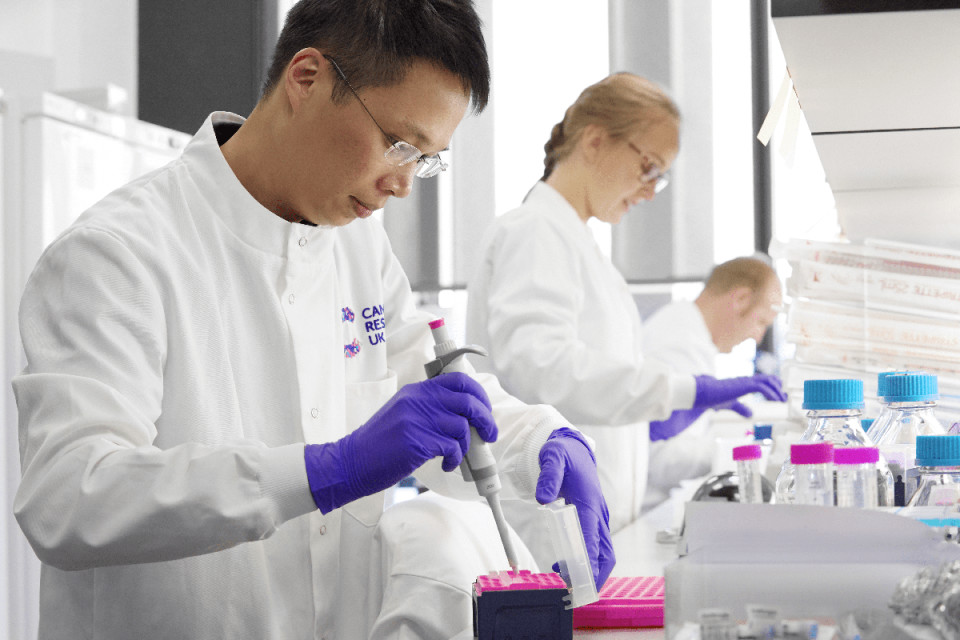Accelerating Oncology Innovation: Ones to watch 2021
By Bruntwood SciTech

Imagine the day when all cancers can be cured - it’s the ultimate objective of cancer research. Yet according to the World Health Organisation, cancer accounted for nearly 10 million deaths, globally, in 2020 alone.
From prevention and early diagnosis, to treatment and cancer management, innovation and collaboration sit at the heart of accelerating oncology research. That’s why at Bruntwood SciTech, we teamed up with some of the biggest names in UK cancer research and clinical excellence, plus four major global pharmaceutical and healthcare companies to combine forces and help accelerate the translation of emerging cancer research into patient benefits. The Alderley Park Oncology Development Programme is working with companies and academic researchers across the UK, to help them develop their innovations more quickly and efficiently, ready to take on new funding or collaborators to accelerate the progress of their innovations commercially.
Five months into the programme, and now approaching the end of part one of the Development Phase, we’re taking a look at the eight projects who have impressed the consortium of experts and have made it through.

Ceridwen Oncology Ltd
Established by Professor Andrea Brancale, Dr Ramsay McFarlane and Dr Jane Wakeman from Bangor University and Cardiff University, the team have identified unique features of a rare bone cancer called chordoma - subsequently enabling them to identify a series of molecules that inhibit the ability of the cancerous cells to progress the disease. Excitingly, the compounds and drug targets they have discovered may also be used to treat other more common cancers.
What are you enjoying about the programme so far?
“The enthusiasm of the Oncology Development Programme team has been infectious. As academics moving into the commercial world our ability to benefit from so much leading expertise is very exciting.”
Cardiff University with TnA Therapeutics
Professor Richard Clarkson, Professor Andrew Westwell, Professor Andrea Brancale and Dr Ellie Rad are a group of Cardiff University academics with wide-ranging interests in cancer drug discovery and biology. They began work on an emerging drug target known as Bcl3 and teamed up with Dr. Luke Piggott, Chief Scientific Officer, and Jim Tripp, Founder and Principal, at TnA Therapeutics.
Their new drug therapy aims to induce lasting tumour regression by targeting cancer progenitor cells that are responsible for drug resistance, relapse and cancer spread (metastasis) in high-risk disease.
What inspires you to work in the science sector and particularly in oncology?
“Despite tremendous progress in our scientific understanding, there remain many cancers where treatments and patient outcomes remain very limited. Many cancers are still treated with aggressive and non-selective chemotherapies discovered decades ago, despite their associated toxicities and poor long-term efficacy. There remains an urgent need for better drug treatments in specific treatment-refractory types of common cancers such as breast (triple-negative) and metastatic colorectal cancer; this is where our attention is focused.”
ImmTune Therapies
With a PhD in Nanotechnology and Chemistry, Dr Bakul Gupta, CEO, has been working at the intersection of biology, chemistry, and nanotechnology for over 10 years. ImmTune Therapies is pioneering the development of an off-the-shelf injectable cell therapy platform which re-engineers patient’s immune cells inside their bodies to treat disease. ImmTune's in-body process of generating therapeutic CAR-T cells has the potential to produce more potent, cheaper and easily administered cell therapies, reducing the patient burden and scaling the use of these powerful therapies to a wider patient population.
What would you say to someone considering a career in science?
“As a woman entrepreneur in STEM, I am very actively involved in promoting science to younger people, especially girls! My key advice to anyone considering a career in science, is to find out which topic interests you the most, and then communicate and connect with people - there is a lot one can learn from interacting with a diverse set of people. It helped me broaden my own mindset, making me aware of scientific fields of development, and also helped me become more agile and versatile in the way I think and respond to challenges.”

Itecho Health
Led by Dr Adrian Brown, CEO and Consultant in Public Health, Itecho Health is a digital health company led by clinicians and technology experts. Their platform, Ascelus, is focused on remote monitoring and management of long-term conditions including cancer. Following on from their work in prostate cancer, the team decided to explore the use of the Ascelus platform to collect Real World Evidence focussed on oncology drugs. By collecting robust quality of life data from patients and integrating this with hospital IT systems data on healthcare utilisation, this will allow pharmaceutical companies to provide high quality evidence to regulators.
What have you enjoyed most about the programme so far?
“It has been fantastic to be in such a high calibre scheme with some fascinating state of the art projects. The majority of the projects are based on drug discovery and it has been great to be able to represent a different, but in our view equally important innovation in oncology. We have particularly enjoyed applying the business models in a practical way to a real example (rather than in the past when it has been more theoretical).”
LOX Project, Drug Discovery Unit (DDU), CRUK Manchester Institute
Professor Caroline Springer from the Drug Discovery Unit (DDU) at the Cancer Research UK Manchester Institute has led the discovery of lysyl oxidase (LOX) inhibitors. They have been designed to prevent the crosslinking of the extracellular matrix which is a key step in the progression of pulmonary fibrosis, a disease that severely affects the quality of life of large numbers of patients. LOX also has important roles in the progression of tumour metastasis, which is the major cause of death in cancer patients. LOX inhibitors address large unmet needs as there is currently no effective therapeutic option for cancer metastasis and pulmonary fibrosis.
What inspires you to work in the science sector and particularly in oncology?
“I am inspired by the possibility of adding to cancer drug discovery knowledge and thereby having the opportunity to make a difference. I anticipate that the hard work from our team will provide new and improved opportunities to those cancer and fibrosis patients who currently have few treatment options. I feel that oncology drug discovery is a particularly important area of scientific discovery; whilst many diseases and some cancer types have benefited from wonderful new therapeutic advances, there has been less success with other cancers, and currently there is no standard-of-care drug for patients who are suffering from pulmonary fibrosis.”
Treating RAS-driven cancers, CRUK Manchester Institute
Professor Richard Marais and long-term collaborator Professor Caroline Springer, from the Molecular Oncology Group and Drug Discovery Unit respectively at the CRUK Manchester Institute, lead a multidisciplinary team composed of basic research bioscientists, medicinal chemists, and clinician scientists. They have developed a small molecule inhibitor that is effective in RAS-driven cancers, which account for about a third of human cancers. Despite over 40 years of research, most RAS-driven cancers remain areas of unmet clinical need and patients with these cancers still generally receive conventional chemotherapy - often with limited efficacy and potentially high toxicity. Their project proposes to use their inhibitor to provide targeted intervention for this large category of non-small cell lung cancer, colorectal cancer, melanoma and other cancer type patients. Their preclinical studies show that the inhibitor is effective in these multiple cancer types, and a Phase I clinical trial has shown it is well-tolerated by patients, with evidence of responses. So, watch this space.
What have you enjoyed most about the programme so far?
“The programme has taken me out of my comfort zone and challenged me to think beyond the science of our inhibitor and understand what other types of data we need to gather or generate for its potential as a novel therapeutic option for cancer patients to be realised. It is, for me, a different way of thinking about something I have spent a career thinking about, which is both challenging and refreshing.”

Oxford Cancer Analytics
Mr Andreas Halner, President and Chief Operating Officer and Dr Peter Liu, Co-Founder, both met whilst studying for their PhD. Combining Andreas’s mathematical skills and medical background with Peter’s cutting-edge oncology experience, Oxford Cancer Analytics seeks to detect cancer early and radically improve upon clinical management following cancer diagnosis, through analysis of patient blood samples with tailored machine learning tools. The company has already been able to double detection of the earliest stage of multiple cancers from sensitivity in the 40%s to a sensitivity in the 80%s, whilst maintaining specificity at 99%. Oxford Cancer Analytics is about to announce the closing of their oversubscribed seed round.
What are you looking forward to most about the next stages of the programme?
“I’m especially looking forward to exploring the multiple uses of Oxford Cancer Analytics’ assets for scientific and commercial applications we hadn’t previously envisaged and learning about uncharted regions of potential customer landscapes.”
pHion Therapeutics
Founded in 2017 by Professor Helen McCarthy, pHion Therapeutics is based on technology developed at Queen’s University Belfast and focuses on the development of RALA/mRNA therapeutic vaccines for viral infections and oncology.
pHion Therapeutics is developing a therapeutic vaccine for the treatment of epithelial ovarian cancer, which accounts for 90% of all ovarian cancer cases, of which >50% are highly aggressive High Grade Serious Carcinomas (HGSC). The disease can develop without symptoms, which means that most patients are diagnosed at stage 3 or 4, where the 5-year survival rate is only 15%. A key feature of pHion’s vaccine is that it produces a CD8+ response, which is believed to be important for treating HGSC. Their vaccine, which is a genetic cargo (mRNA), is delivered into the correct cells using a novel cell-penetrating peptide as a delivery vehicle. Their vision is to take their technology along the preclinical development pipeline with the aim of commencing safety and toxicology studies within the next 18 months, before advancing to the clinical studies in patients.
What inspires you to work in the science sector and particularly in oncology?
“For me, it is that we still have so much to learn and understand and that is a constant challenge that drives me. The moment you think you know it all, you realise very quickly that you still have so much to learn.”